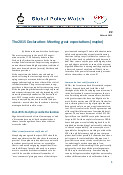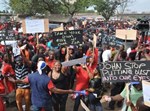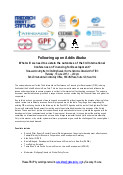Social Watch news
Published on Sun, 2015-07-05 00:00
The implementation of the Financial Services Law, passed in Bolivia in August 2013, has marked the political rhythm of the financial system in the country. The government set the pace for the private banks within its public policy of access to financial services, privileging specific actors, in particular the wage-earners and small and medium enterprises.
The law marked the economic rhythm for the sector, too. The body of macroeconomic policies prioritizing price stability and an exchange rate that strengthened the position of the Bolivian peso compared to the US dollar and other currencies and an external environment of high prices for the commodities the country exports, generated a scenario of liquidity and growth for the financial sector in particular and the economy as a whole.
|
Published on Fri, 2015-07-03 13:26
The peoples’ uprisings in the Arab region presented a golden occasion for revisiting the European Neighborhood Policy (ENP) and particularly the partnership between the Arab countries and the European Union (EU). The Joint Communication of the High Representative and European Commission, “A New Response to a Changing Neighborhood, ” highlighted important lessons learnt but remained an exercise of self-assessment without the engagement of EU partners and relevant stakeholders (including civil society) for what are widely considered today as major historical changes in the Arab countries.
|
Published on Fri, 2015-07-03 11:54
The need to prevent the damaging drainage from developing country economies represented by illicit financial flows has been gaining international attention. In a recent report (“the Report”) the UN Independent Expert on Foreign Debt and Human Rights, Mr. Juan Pablo Bohoslavsky (“the Expert”), added his voice by developing the implications human rights law and principles have for action on this front.
|
Published on Wed, 2015-07-01 22:57
The June negotiations round on the outcome document for the post-2015 development agenda ended without resolution of the means of implementation issue.
The 6th session of the Post-2015 intergovernmental negotiations was held on 22-25 June at the UN headquarters in New York.
Means of implementation (MoI) have been the subject of many disagreements during the Sustainable Development Goal (SDGs) negotiations in 2013-2014 when many developing countries wanted to have MoI under each specific goal while developed countries wanted to keep MoI only under goal 17. Now the discussions are about how MoI should be integrated into the post-2015 agenda as well as how the outcome of the Financing for Development (FfD) track should be incorporated into the final outcome document. The current disagreements show a clear North-South divide.
|
Published on Mon, 2015-06-29 00:00
While negotiations on Financing for Development and the means of implementation of the Sustainable Development Goals (SDGs) within the UN are deadlocked, a new Global Financing Facility (GFF) in support of Every Woman Every Child is going to be established outside of the UN. The creation of the GFF was initiated by the World Bank and the governments of Canada, Norway, and the United States, and announced at the UN General Assembly in September 2014. It will be officially launched in July 2015, at the third Financing for Development Conference in Addis Ababa, Ethiopia.
The GFF is expected to play a key role in financing for reproductive, maternal, newborn, child and adolescent health (RMNCAH) and will serve as a major vehicle for financing the proposed SDG on healthy lives. It is being positioned as the most important new funding mechanism for the SDGs and the Post-2015 Agenda, similar to the Global Fund or GAVI.
|
Published on Fri, 2015-06-26 15:17

Khan, Mokhiber, Donoghue,
Schillinger, Rücker and Bissio.
|
What can New York learn from Geneva? Can human right mechanisms, such as the Universal Periodic Review (UPR) developed by the Human Rights Council in Geneva serve as a model for the follow up of the new development agenda currently beingdiscussed in New York?
That was the guiding question formulated by Hubert Rene Schillinger, director of the Friedrich Ebert Stiftung in Geneva to a panel on “accountability mechanisms for implementing the SDGs” held last June 18.
Irish ambassador David Donoghue, co-facillitator of the drafting process of the new development agenda admitted that “accountability” is referred to as “the a word” in New York and he explained that “to address sensitivities in various quarters, the phrase we use is ‘follow-up and review’ instead”.
|
Published on Fri, 2015-06-26 14:59
The country is experiencing its worst energy crisis in over a decade which is paralysing the economy and ruining livelihoods. Two public demonstrations were held late February in Accra and Kumasi, Ghana's two main cities, over electricity load-shedding which gives consumers 12 hours electricity and 24 hours total blackout.
But while the opposition-led demonstrators were thumping the streets with anti-government placards and slogans, organised labour in the country took up the struggle on a different front largely ignored by organisers of the demonstration but which many consider as being at the heart of the energy crisis.
|
Published on Fri, 2015-06-26 10:38
In 2012, governments agreed at the Rio+20 conference that all decisions on the post-2015 sustainable development agenda would be both consistent with international law and respect the principle of common but differentiated responsibilities (CBDR) and respective capabilities. The zero draft of post-2015 agreement, as well as the Open Working Group’s outcomes which preceded it, reiterate their grounding in the UN Charter with full respect for international law, including (implicitly at least) international human rights law. In the latest iteration of the Addis Ababa Accord on financing for development (FfD), meanwhile, governments unambiguously commit to respect all human rights, including the right to development.
|
Published on Thu, 2015-06-18 14:45
The first section of the Zero Draft displays a structure that is more coherent and orderly than the introduction to the Open Working Group (OWG) report. The division into 8 subtitles (Introduction, Our Commitment and Shared Principles, Our World Today, Our Vision, The New Agenda, Implementation, Follow-Up and Review, and A Call for Action to Change the World) makes it possible to distinguish the member states’ vision, their level of ambition and, therefore, their political approach more clearly than was the case with the OWG report. This new document is more clearly explicit about the tacit agreements, as well as the points of view about crucial issues such as the development model and the environment, the leading role given to the business sector and the significance that the Agenda carries for member states in terms of commitments and obligations.
|
Published on Thu, 2015-06-18 00:00
The outcome document for the Third International Conference on Financing for Development (FfD3) is being finalized at the United Nations in New York. This is a key moment to make an assessment and influence the issues under negotiation to ensure progress is not lost in the interests of fact-tracking consensus. The outcome document must establish new ground on a range of issues such as combatting illicit financial flows and global tax cooperation. At a side-event jointly organized by Friedrich-Ebert-Stiftung, APWLD, Regions Refocus, DAWN, SID, Latindadd, CIDSE, FTC, Eurodad, GPF, Social Watch, Third World Network and ANND, we want to discuss proposals and compromises on the table and look into possible outcomes of the Addis Ababa conference.
|
SUSCRIBE TO OUR NEWSLETTER
Submit

|









